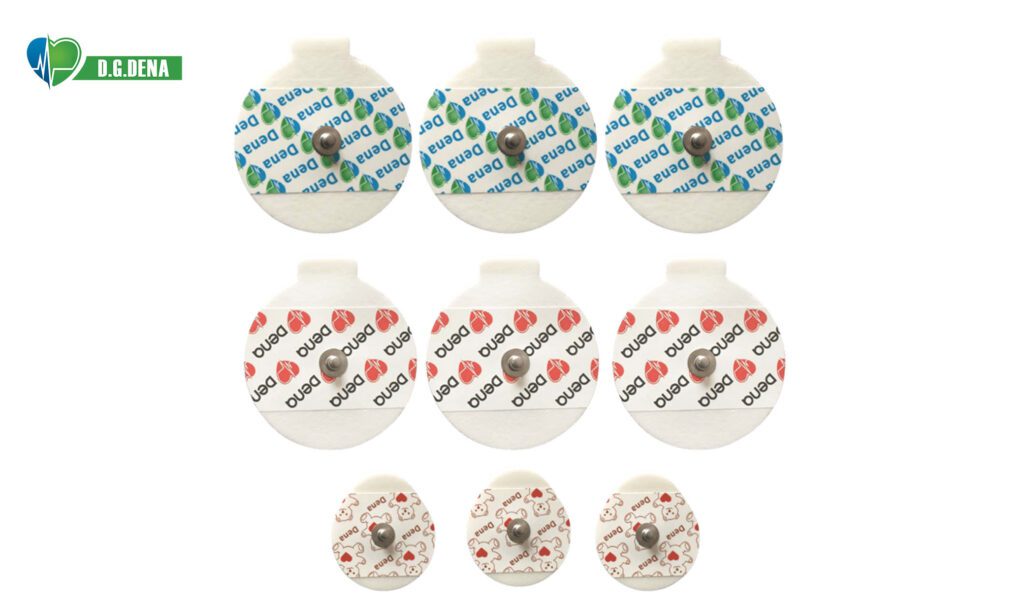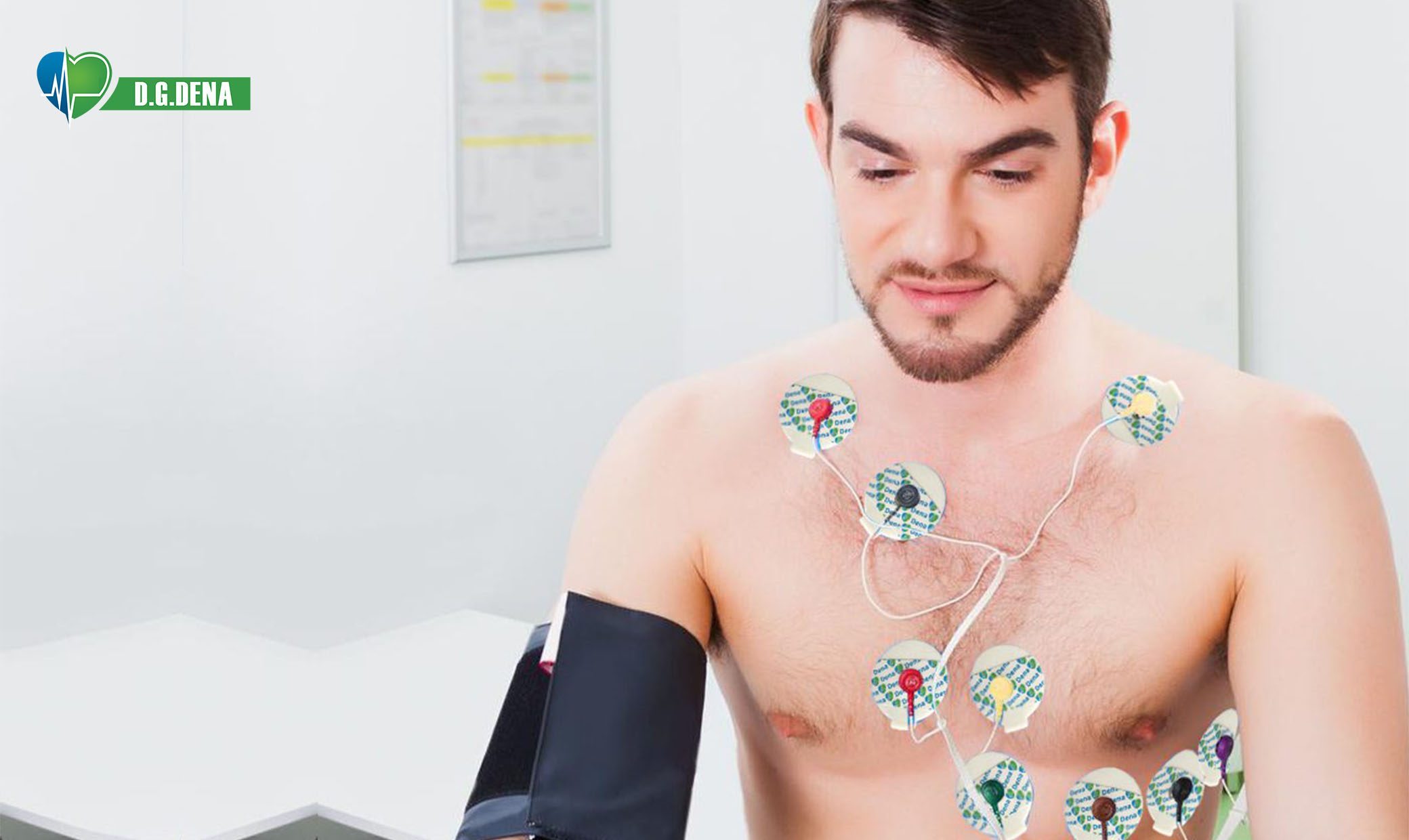Standard Chest Electrode Features (Ensuring Accurate ECG Readings)
Electrocardiogram (ECG) testing is vital in modern cardiovascular diagnosis, offering a comprehensive and accurate view of potential heart conditions. The accuracy of these tests largely depends on the condition of the chest electrodes used. These electrodes capture the heart’s electrical impulses and transmit them to the ECG monitor, providing professionals with essential information for assessing heart conditions.
Here, we will go through the most important features of a standard chest electrode and how they are completely indispensable for successful ECG testing.
What Is a Chest Electrode and Its Role in Cardiac Diagnostics?
A Chest Electrode (Chest Lead or ECG Electrode) is an adhesive, disposable medical device. It is placed on a patient’s chest to measure cardiac rhythms and carry electrical impulses to the ECG machine. The reliability of transmitted data depends on the electrode’s quality and conductivity. Chest electrodes are essential for stress tests, operating room monitoring, and routine ECG procedures.
Let us discuss the Standard Chest Electrode Features.
High-Quality and Standard Chest Electrodes Key Features
Skin-Friendly Adhesives: Key Feature of Highly Rated Chest Electrodes
A key standard chest electrode feature is skin-friendly adhesion. Poor-quality adhesives irritate and compromise signal transmission, resulting in defective results.
Key Features:
- Hypoallergenic Properties: Reduces risk of skin irritation or allergy.
- Rigid but Soft Adhesion: Ensures correct fit with comfort to the patient.
- Strong Stickiness: Ensures secure electrode adhesion, preventing detachment during testing—especially during stress ECG procedures.
Hydrogel adhesives, for example, are known for having good adhesion and the ability to conduct signals well with comfort.
Improved Conductivity: The Role of Cutting-Edge Materials in Chest Electrodes
Accurate signal transmission is required to make correct diagnoses. A very conductive chest electrode guarantees the undistorted transmission of heart electrical signals to the ECG device.
Conductive Gel: Facilitates efficient conduction of electrical signals.
Ag/AgCl Sensors: Silver chloride electrodes provide good conductivity and minimize artifacts in the signal.
Weak-conductivity electrodes can lead to poor readings, delayed diagnosis, and treatment.
Long-Term Flexibility and Stability: Ensuring Reliable Function in Chest Electrodes
The standard chest electrode must be resilient and flexible enough to accommodate any clinical scenario.
Most Important Characteristics:
- Flexible Structure: Offers good contact on the patient’s body, improving the contact and the signal quality.
- Long Shelf Life: Maintains adhesive and conductive properties even after long storage.
- Flexibility and durability are critical in emergency settings, where reliability is the top priority.
- Patient Comfort: The Importance of Ergonomic Design in Chest Electrodes
- Comfort is critical to the success of ECG testing. A poorly designed electrode can be uncomfortable, causing patients to shift and disrupt signal transmission.
Key Characteristics:
- Soft and Lightweight: Minimizes discomfort when used for prolonged periods.
- Hypoallergenic Design: Prevents irritation, especially for sensitive skin.
- Rounded Edges: Painless and easy to remove, eliminating the risk of adhesive residue.
- Ease of Application: Features Making Chest Electrodes User-Friendly
Ease of application and removal is an essential feature of a high-quality chest electrode.
Primary Qualities:
- User-Friendly Design: Permits quick and easy attachment.
- Residue-Free Removal: Will not leave behind any adhesive or gel on the patient’s skin, giving them a clean and comfortable experience.
This feature is particularly beneficial in active clinical environments where efficiency is paramount.
Universal Compatibility: Chest Electrodes Compatible with All ECG Devices
A universal chest electrode must be compatible with multiple ECG devices.
Most Important Features:
- Universal Fit: Fits into other ECG device models without any hassle.
- Standardized Connectors: Ensures seamless integration with existing systems.
Universal compatibility minimizes the need for multiple electrodes, streamlining medical procedures.
Affordable Excellence: Cost vs. Quality in Chest Electrodes
Cost-effectiveness is an important consideration for healthcare professionals. Chest electrodes that balance superior quality with affordability have the greatest potential for universal adoption.
Key Features:
- Reasonable Price: Allows for bulk buying for hospital use.
- Reliability in Performance: Reduced replacement frequency saves money in the long run.
- Biocompatibility: Materials That Enhance Safety in Chest Electrodes
Another typical chest electrode feature is biocompatibility, which ensures that the materials used in the electrodes are safe for long-term use on human skin.
Key Qualities:
- Latex-Free and PVC-Free: Prevents allergic reactions and environmental problems.
- Skin-Friendly Materials: minimize the chance of irritation or infection.

Dena Disposable Chest Electrodes
Dena ECG Electrodes represent the gold standard in chest electrode technology, incorporating all the critical performance features outlined previously. Key advantages include:
- Excellent signal transmission with Ag/AgCl sensors.
- Hypoallergenic, latex-free materials.
- Improved adhesive properties for secure positioning.
- Flexible foam back for patient comfort.
- Universal compatibility with all ECG equipment.
- Combining cost-effectiveness with reliable performance, they offer the best value for healthcare facilities.
Optional Features:
- Available in adult and pediatric models.
- Internationally quality standards compliant.
Dena ECG Electrodes deliver clean, unimpeachable ECG signals to provide consistent results for routine or emergency testing.
Conclusion
It is important to understand the typical features of standard chest electrodes to ensure accurate and reliable ECG information. Be it skin compatibility, high conductivity, durability, or cost-effectiveness, all factors contribute towards providing good care.
In choosing electrodes for your practice, look out for products such as Dena disposable chest electrodes that are intended to conform to the highest standards of performance and patient safety.
By using good-quality chest electrodes, healthcare professionals can enhance patient satisfaction and diagnostic quality and thereby have improved cardiovascular care outcomes.

